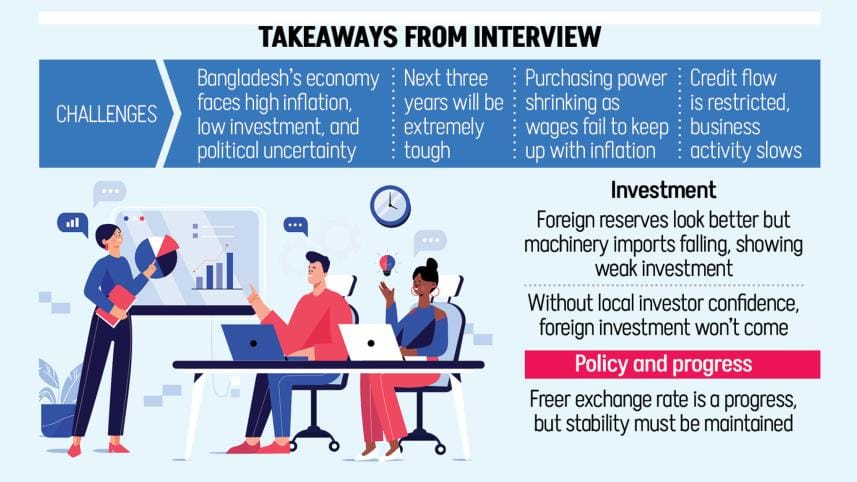It will take political govt at least 3 years to stabilise economy

As things stand currently, it will take the next political government at least three years to stabilise the country's economy, Taskeen Ahmed, president of the Dhaka Chamber of Commerce and Industry (DCCI), has said.
Speaking to The Daily Star in an exclusive interview, he explained that Bangladesh's economy is under growing pressure from high inflation, slowing investment, and deepening political uncertainty. The law-and-order situation has yet to inspire full confidence.

He also spoke about the challenges facing businesses, the erosion of purchasing power, and why bold, long-term reforms — rather than short-term fixes — are needed to put the economy back on track.
"Whoever comes to power, the first two and a half to three years will be extremely difficult," he warned.
"The signs are already there. We have been operating on short-term measures such as quick export pushes and policy tweaks, but you cannot run an economy like that forever. Medium- to long-term planning has been absent. It will take at least three years just to stabilise," he added.
According to Ahmed, key weaknesses including low investment confidence, high inflation, and a credit crunch are holding the economy back despite official narratives of recovery.
He noted that people often cite the closure of 200-300 garment factories, which draw attention because they belong to the formal corporate sector. But there are no reliable data on how many of the nearly 80 lakh small and medium-sized enterprises (SMEs), employing 20, 50, or 100 workers, have shut down.
"These are the silent casualties of rising interest rates, political instability, and limited finance. The long-term effects will be felt in the years ahead," he said.
SHRINKING PURCHASING POWER, LIQUIDITY
Ahmed's foremost concern is the steep decline in purchasing power across the population.
"When people's incomes shrink, they don't buy new clothes — they pay their electricity bills, their water bills. They buy essentials. Businesses feel it immediately," he pointed out.
"Our currency has lost value, but wages haven't increased to keep up. Inflation has outpaced income. That's the ground reality," he added.
He also highlighted a troubling slowdown in money circulation, which has directly hit both consumption and investment.
"The banking system is under strain. Interest rates are up. Credit isn't flowing. When money doesn't circulate, business activity slows. That's not just theory — that's what we are seeing every day," noted the DCCI president.
GOOD RESERVES, BUT…
Ahmed acknowledged the recent rise in foreign exchange reserves but cautioned against taking the numbers at face value.
"Yes, reserves are improving. But where's the capital machinery? That's what really tells you if businesses are investing. If capital goods aren't being imported, it just means businesses are not expanding," he said.
He added that while the shift from hundi to formal remittance channels is a positive sign, it does not reflect higher earnings, only better tracking.
"It is good that people are using proper channels now. But we should not misread it as economic improvement."
The DCCI president lauded the government for finally allowing the exchange rate to float more freely.
"At one point, banks were not allowed to offer more than Tk 109 per dollar, while the open market was at Tk 118. That gap pushed remittances into the hundi market.
"Now it's more aligned, with the rate being around Tk 124 in open markets, and Tk 121–122 at banks. But we need to maintain this balance," he stated.
INVESTORS NEED CONFIDENCE, NOT EVENTS
On foreign investment, Ahmed said if local investors are not confident, foreign investors will not come either.
"Foreign direct investment has always been low. Our own businesses are not reinvesting, and that says a lot. Some government initiatives, like investment summits, create buzz but often lack follow-up," he said.
He added, "Some of our colleagues did not even know when the last summit was happening. Others asked: what came out of it?"
The DCCI president also cautioned against believing that a political government will be able to solve everything.
"Let's face it, when we talk about business, politics always creeps in. You can't separate them. Political uncertainty slows down everything — from circulation and investment to even optimism," he noted.
"However, no matter which party forms the next government, the road ahead will be tough. This is not about slogans, it is about deep structural reforms. We need to fix banking, ensure stable power supply, and maintain policy consistency. Otherwise, we'll keep going in circles," he added.
He stressed that quick fixes will not work anymore. The country needs long-term thinking and political will.
"Real reforms, painful as they may be, are the only way forward. The economy won't turn around in six months, it will take years. But if we don't start now, we'll fall even further behind," Ahmed concluded.




 For all latest news, follow The Daily Star's Google News channel.
For all latest news, follow The Daily Star's Google News channel.
Comments